June 2012 — August 2012
LESSONS FROM THE LAND OF BIG SMILES
I made a conscious decision in June 2012 not to watch the movie Blood Diamond. It’s a critically-acclaimed film about the gruesome civil war in Sierra Leone, its warlords, and the conflict diamonds that financed their brutal assault on civilians as they tried to seize illegitimate power. The film’s plot is fictional, but its depiction of the war’s atrocities are not, and I wanted to start my stay with an open mind – not one swimming with the negative, Heart of Darkness-style stereotypes that have dominated popular discussion of this small West African country for decades.

I had just returned from a trip to Morocco, and was in Canada long enough to cross the stage, graduate, and repack my bags. I was off on a two-and-half-month media development internship in Freetown with a non-profit called Search for Common Ground and its affiliate, the Independent Radio Network.
Sierra Leone is where I cut my teeth in travel and journalism, so it has a special place in my heart today. I’m still in touch with many of the people I met there, and hope that one day, I’ll have a chance to return. Please forgive some of the naivety and dated language in my writing at the time, and keep in mind that much has changed since I was in Sierra Leone. Some of the information in this blog does not reflect the current socio-economic situation after a devastating ebola outbreak killed more than 10,000 people in the region, and mudslides in Freetown left over 1,000 citizens dead or missing in August 2017.
Below, you’ll find less of a travel itinerary than reflections on my experience, although I’ve outlined a few things to see and do, should you have the good fortune of visiting Salone, the Land of Big Smiles. Check the bottom of the blog for a Know Before You Go section.
Week One: Welcome to the Land of Big Smiles
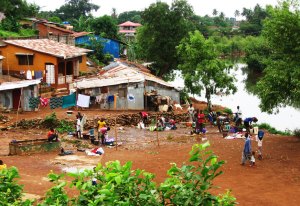
If you drive around Freetown, you’ll probably notice a big sign welcoming visitors to the “Land of Big Smiles.” For the most part, it’s an accurate billboard – nearly every day here, I am greeted by someone new with an affectionate, “Hey, white girl!” and an offer to accompany me wherever I’m walking. It’s a cheerful disposition that all but masks the difficult realities of life here – only 10 years out of a civil war that tore the country apart, most Sierra Leoneans struggle to feed their families on less than CAD 50 a month.
I left Canada on June 9, 2012. My parents choked back tears from the top of the airport escalator, clutching the Nutella, spare batteries and hand lotion I removed from my overweight suitcase. It was my first solo travel experience and Sierra Leone, I would later learn, is not a destination for beginners. My flight from Montreal to Paris went smoothly, but as I made my connection to Freetown, the nerves set in. I was lucky to meet Pat, a kind Irish businessman in his 50s, on the plane, who had lived in and out of Freetown for years. He gave me his business card and a few dollars in the local currency, the Leone, to get me started.
It was a nasty shock when the plane landed in Conakry, Guinea a few hours later – somehow I had failed to notice that my flight had a stopover. Most of the passengers exited here, as a flight attendant assured me we would be carrying on to Sierra Leone.
FROM THE AIRPORT TO FREETOWN
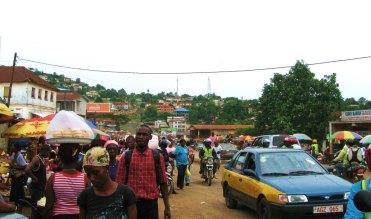
Lungi International Airport is an organized kind of chaos. The Sierra Leone River separates it from the capital city, which makes the scramble for a spot on the ferry into Freetown a rather hectic affair. ‘Lining up’ did me little good, so I shoved USD 50 into the hands of an attendant, who loaded by bags onto a truck, and eventually, the boat. The price may be cheaper for locals, but it certainly wasn’t for me.
(For more information on how to make this crossing, click here).
After weeks of unanswered emails sent to my employer, I was thrilled to find that someone was, in fact, waiting for me at the Freetown port, and together, we crammed into a rather questionable-looking car for the two-hour ride into the city.
The drive in looked like the pages of an outdated National Geographic magazine: naked children played outside of metal sheet homes, women sidestepped potholes with giant baskets on their heads and men worked crop fields with machetes. At the time, I had seen such things only in pictures. When I arrived in Freetown, the signs of civil war were clear in a number of crumbling, half-demolished buildings – some of which still had bullet holes. In my first week, however, I learned that Sierra Leoneans are extraordinarily warm, resilient people with a joie de vivre second to none. No matter where you go in this city, you are likely to find someone dancing, singing or passionately reliving the latest football match.
Heaps of garbage pollute the streams used for bathing and laundry in Lumley Beach, Freetown.
GROCERIES AND GETTING AROUND
I settled into a guest house on Juba Hill, in a part of Freetown called Lumley. It’s a guarded complex with a small yard, no running water, no toilet seats, and sporadic electricity for one or two hours in the morning and evening. Bathing and flushing are accomplished using heavy buckets of water, scooped from barrels outside the house, which are only replenished when it rains enough to fill them. There are mango trees in the backyard, and shards of broken glass and barbed wire atop the cement walls to protect the property from thieves and bandits. Peering out over the balcony on the second floor, I could see the ocean, the palm trees, and the backyards of several complexes like ours in between.

I met my two roommates – Aminata and Sue – along with our two dogs, one cat and innumerable lizards, who make their home in every crevice of the house. When I arrived around 7:30 p.m., they had a warm dinner of barracuda, ground nut sauce and couscous waiting for me. I tried desperately to fall asleep that night, but the pounding of the club located just down the hill kept me awake for hours. I had also set up my mosquito net in the most ineffective, claustrophobia-inducing way possible, which gave Aminata a good laugh the following morning.
On Monday, Sue took me shopping at one of the few Western-style grocery stores in the city. In my ignorance, I was gobsmacked by the prices: Le 140,000 (about CAD 35) for apples, a can of tuna, water, peanut butter, bread, jam and beans. I quickly vowed to learn how to skin my own fish (much cheaper) – a nightly practice at our house as Fat Boy and Kohla, our dogs, watch hungrily from the backyard. I aspire to be as skilled as Aminata, who can remove all the bones in a snapper without wasting an ounce of meat.
On Tuesday, Uncle Pat, a kind older gentlemen who sometimes stays with us, showed me how to cab from work to home. It’s not as simple as it sounds – most drivers insist on charging private fares for white people, called pumui, and only after hard bargaining did we manage to get away with paying double the usual rate. Event then, I crossed town for Le 8,000 (about CAD 2). But I will soon have to take communal cabs, which involves fighting your way into a vehicle against up to 10 other commuters whose destinations fall along similar routes. Sometimes, this process results in injury, and often, a spilled grocery bag or briefcase.

That week, I got a local phone (an indestructible old school Nokia connected to SierraTel) and a rocket stick so I could access the Internet at home. The latter turned out to be a waste of USD 200 – even with the special hotspot, the connectivity was too poor to check an email.
On the weekend, I went to Lumley Beach and ended up helping some local fishermen haul in their nets. I yanked my very own barracuda out of the twine and tossed it into the bucket like a pro. Here, fish are described as “life-giving,” or the “fish of life,” because of how many people rely on them for income and sustenance. I soon found myself at the local market buying my own fish… a trying experience, to say the least.
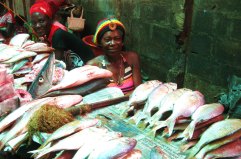
It was difficult for me, a travelling newbie and an urbanite, to embrace and acknowledge the state of my food before it’s cooked and on my plate. At the market in West Freetown, everything sits on dirty newspapers and the flies sit on top of everything on those newspapers. But it was a critical initiation: I learned how much to pay for things, when I was being ripped off, and how to bargain down from the pumui price. I also met our “Fish Mother” – the charming elder Aminata buys our snappers from every week.

I learn about more about how to live and survive in Freetown each day, and look forward to achieving independence here. For now, I keep myself busy with reading, writing, and Krio lessons from my co-worker Ezekiel. It goes without saying that the next two months with be the most challenging of my journalism venture to date, but with a sense of humour, determination and open-mindedness, I am confident they will exceed all that have passed. As they say in Krio, the dominant language here, “Jon soup trow away inside jon res,” which basically means that if you get yourself into something, you’ll get yourself out just fine.
Jon soup trow away inside jon res.
Week Two: Survival of the Fittest
Everyone has different interpretations of what it means to truly ‘live.’ In Canada, most have the incredible luxury of defining the word based on personal taste. For some, it means the white picket fence; for others, it is beautiful scenery or a glass of well-aged scotch. Often as we age, so too does our interpretation of ‘living.’
VISITING FREETOWN’S SLUMS
During the last two weeks, I’ve been privileged to visit a few of Freetown’s slums. Here, I imagine the interpretation of ‘living’ is closely related ‘surviving.’

As I walked through burning trash, feces and swine, I wondered whether the idea of the white picket fence occurs to those whose daily preoccupation is putting food in bellies of hungry children. But I didn’t ask – already attracting stares for engaging in what would later come to be known as ‘poverty tourism’ or ‘poorism,’ I didn’t want to draw further attention. I had been invited in and guided by locals during these visits, but I doubted the community had specifically consented to my whims as a photographer. Sierra Leone is not a popular tourism destination, so if you visit, keep in mind that many places you go will not be accustomed to guests or pictures.
In leaving these communities – home to some of the country’s most vulnerable urban poor – I re-evaluated my own definition of living. After seeing how blurred the line between living and survival could become, it was clear that the challenges I face as a white woman wandering around West Africa are woefully insignificant. In a country where the ruling law is the survival of the fittest, I took a private oath to keep my own survival in perspective.
LANGUAGE, FOOD AND TIME

Speaking of survival, I learned in Week Two that in Freetown, you are only taught something once before you’re expected to perform alone. No more lessons on public transit, drives to the grocery store or guided market tours – from now own, my friends have made it clear, it’s trial by fire. I adapted quickly to Sierra Leone’s fluid concept of time and personal space; I now know that “20 minutes” is really an hour, “on time” means an hour late, and “I’ll call you later” means “I’ll call you in the morning, afternoon and night, and probably send you three or four text messages in between.”
At work, I’m already expected to understand and speak in Krio – a combination of English, French, Portuguese and local languages, not dissimilar to Jamaican Patois or Nigerian Pidgin English. Many of my co-workers have stopped speaking to me in English entirely, and will only translate upon receipt of serious pumui puppy face. Conversations with locals, however, have revealed that my efforts are paying off – faces are quick to light up after hearing a pumui utter a few smart words in Krio, Mende, Limba, Temne or Mandingo. I’m taking lessons from my co-worker Ezekiel, and hope that by the time I leave Freetown, I will be able to understand the constant stream of jokes and laughter that seem to follow me wherever I walk.
It may sound redundant, but another crucial part of my survival here is food. For someone as picky as I am, eating in Sierra Leone has presented many challenges – out of necessity, for example, I have learned to tolerate mango and pineapple, which are the only foods readily available for breakfast daily. I no longer think twice about eating something that has eyes, teeth and fins, and consider ground nut sauce, plantains, okra, potato leaf and barracuda a regular part of my diet. I can stomach the spiciness of dishes like foufou and pepper soup, but I don’t think I will ever adjust to the honey, which comes straight from the bush and is unbearably sweet. Let me add that there are tonnes of restaurants in Freetown, but most serve local food, and those that don’t are quite expensive (certainly not in the budget of an intern and recent university grad).
TRANPORTATION IN FREETOWN
One of the most important “sink or swim” survival tests to date has been navigation. Most roads in Freetown have yet to be paved, and the potholes rival those of downtown Montreal. Pedestrians never have the right of way, even at crosswalks (“zebra crossings”), and jumping off the road for oncoming traffic has become second nature. I’m still getting the hang of cabs, which are shared between three or four people, and don’t drop you off at your destination, but a landmark in the direction all the passengers want to go. It takes three cabs at three different landmarks just to get to work – if I’m lucky enough to find one that will take me at regular price.

For these reasons, I prefer to travel by okada or poda poda. If you opt for an okada (motorbike taxi), choose a vehicle with an extra helmet and ask for them to drive safely (Take time, oh! in Krio). Okadas are a fast, fun and inexpensive means of getting around, and a short ride costs roughly Le 1,000. Poda podas are cheap too – large vans with makeshift seating and about 16 people crammed inside. Listen carefully for the conductor’s call – many will use local slang to announce their destination. Downtown Freetown, for example, sounds a lot like Tow! Tow! Tow!, so double-check with the driver before getting in. And for the love of God, hang on – I still have the bruises from my first poda poda ride, which took me all the way from work to home for the equivalent of Canadian quarter 0.25 (Le 1,000).
DON’T PICK THE WRONG FOOTBALL TEAM
Football is another critical matter of survival here. For a Le 1,000 entry fee, you can cram yourself into a crowd of dozens gathered around a small tube TV in someone’s house, which is how most Sierra Leoneans keep up with the game. I went to my first match with Aminata and learned instantly that survival means being an England fan – so if that’s not your team, convert immediately. People get VERY upset when their team loses, and I advise you to wail and shout like the best of them should you be present for an England loss. In the case of pick-up football on the beach, keeping your head afloat means keeping up with the fancy footwork of little kids, and shelving your pride if you’ve been playing for 15 years, and a six-year-old kicks your butt. I barely kept up when I played last weekend, and people seemed to get a hoot out of watching “the white girl run.” It’s a sight so unfamiliar, that when I asked to join the game, one of the older boys said something so incredibly endearing, I’ll never forget it: “The first rule in football is not to touch the ball with your hands. You are only allowed to kick it.” I smiled and nodded, deciding that instead of telling him we have football in my country, I’d simply bring it on and show him.
FOUR O’CLOCKS AND HIGH SCHOOL MUSICAL

At home, my bedroom has become a kind of Darwinian chamber where only the strong survive. For the last two weeks, I have waged war on all critters intent on invading, including spiders, tiny worms, mosquitoes and flies. A few days ago, I was defeated by one of the Four O’Clocks – the little geckos who live in the crevices of the house. This one saw fit to jump on my desk while I was working, and according to local legend, if you are bitten by or kill one of them, you will die at exactly 4 p.m. the following day. Had I known this while it was in my room, perhaps I would not have been so intent on catching it. He escaped this time, and I hope he uses his freedom to tell all his friends about me – I dare them to come back.
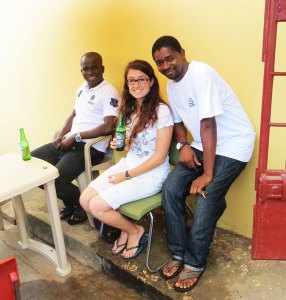
Despite such misadventures, I am fortunate enough to be able to include a few creature comforts in my survival strategy. On the weekend, I went out for a for a beer with a co-worker and thoroughly enjoyed a local brew called Star. It has a pleasant apricot flavour, is made from cassava leaves and costs less than a dollar. I’ve also started KD Fridays, to treat myself at the end of the week to one of the boxes of Kraft Dinner I brought with me (an unfortunately guilty pleasure of mine).
I also bought a disc containing 12 pirated movies. It would be exciting (I packed none), had it not been for the fact that the only English films available on the streets where I live are Disney’s High School Musical and a couple of crappy dance flicks. I am truly at a loss as to why this series is so popular here, but in the spirit of Darwin, I’ll adapt.
When it isn’t pouring rain, in my free time I watch the sunset on the beach, chase the dogs, or climb to the top of Juba Hill. It’s as straining on my legs as it is stunning for my eyes: from the top, you can see virtually all of Freetown, from the beaches to the mountains and the little houses below. Life in Sierra Leone is hard, but I’ve officially changed my definition of ‘living.’
Above, the view from the top of Juba Hill and the sunset at Lumley Beach.
Week Three & Four: Life in African Standard Time
Now that I’ve been here a month, people have started asking, “So how do you like Sierra Leone?” I wish I could come up with a more descriptive answer than “good” or “fine,” but the question is deceptive in its simplicity. There is no way to describe my experience here in the amount of time someone is willing to listen; since my June arrival, I have cut up my legs trying to body surf, waded through the flooded streets of Freetown and been stranded in a jungle in the middle of the night. Last weekend, I broke a jar of jam in a restaurant and accidentally squashed a frog. But crazy and hectic is all part of the routine, and part of living in African Standard Time (AST). Locally, you may hear it called Black Man Time, but that’s an expression I’m not comfortable using.
EARNING MY SIERRA LEONEAN NAME
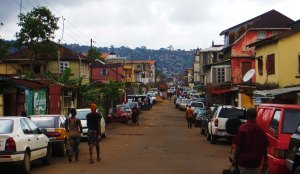
I’m out the door by 7 a.m. every morning to beat Freetown’s gridlock traffic. It’s a hazardous, polluted and bumpy half-hour ride to Search for Common Ground, the global non-profit that sponsored my media development internship. My place of work however, the Independent Radio Network (IRN), is a 10-minute walk away from the office. But because of AST, it takes 20 on a good day. This is the result of pothole and puddle-dodging, and a dozen or more people who stop to greet me along the way. I can’t seem to catch a break from calls of “white girl, white girl!” or the giggles, stares and jokes at my expense that follow. And every day, without fail, the people from the previous day stop to ask if I remember their names, adding more minutes to my journey. Despite the delays, I’m flattered by the attention and curiosity, and their efforts to welcome me into their country. The most popular questions I am asked to date (other than for my phone number) is what kind of fruits grow in Canada, and whether Canada is it’s own country, or simply part of the United States.

By the time I get to IRN, the power is usually out and I’m alone until 10 a.m., when everyone else shows up. I spend this time jotting down story ideas, working on my reports and stalking the lizards who live outside the office. If the blackout persists, Ezekiel and I play ting tang two – a sort of complicated Sierra Leonean tic tac toe played with paper and seeds. He beats me every time, but loses at ‘squares,’ a paper game I taught him. I eat a second breakfast when my co-workers Millicent and Sahr come in – communal dining is very important in Sierra Leone.

Last week, I was officially ‘initiated’ by the IRN team – a rite of consumption passage that involves eating the spiciest rice and the sourest fruit on the market. After I passed the rice test and devoured my ‘monkey wine,’ I was given my very own Mende name – Pumui Magenda, which means “white girl” and “child of God born in the morning.” I am now so used to both this name and “white girl,” that answering to ‘Elizabeth’ will seem strange when I get home.
A CAT-WALKING WHITE GIRL
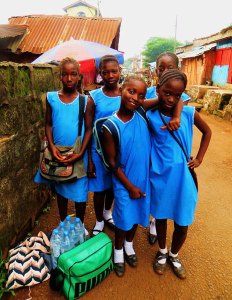
I finish work around 5 p.m., to meet my ‘entourage’ of school girls outside the office. They follow me daily on the walk back to Search for Common Ground, bouncing around behind me with their hips waving and their chests out. Often, I’ll whip around suddenly and make a scary white girl face, just to watch them giggle and freeze. This week, I finally asked them why they found me so funny, and one said, “Auntie – it’s because you catwalk!” The exchange sent them into fits of laughter. Uncle Pat later explained: I walk much more quickly and purposefully than most Sierra Leonean women, which make me a ‘cat-walker.’
Auntie, it’s because you catwalk!
(An interesting side note: when I first took a picture of my entourage, all the girls were all smiling. Then an older woman scolding them for being ‘silly’ in the photo. “What will she think of you?” she said angrily, pointing to me. She told them to show me their more serious ‘school face’ and asked me to take it again).
Fat Boy and Kohla greet me when I get home around 7 p.m. (there’s no avoiding traffic on the way back, unfortunately). Our dogs are energetic and relentless, and so is Kitty – who will mew for hours if he is not fed leftover fish by 9 p.m. Once, Sue bought Kitty his very own can of sardines, but he refused it because it wasn’t fresh. He gave us a look that clearly said, “That’s poor-cat food,” so I told him he was spoiled. The dogs are no better – they eat only rice and cassava, and howled upon being served proper “dog food” from Canada. I suppose this makes sense seeing as there isn’t any packaged dog food here, but I’m still entertained by the idea of rice-fed pups.
CAR TROUBLE IN TONKOLILI
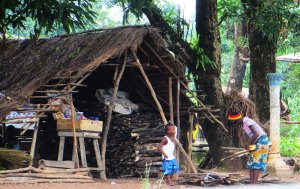
My greatest adventure to date has been a work trip to Tonkolili District in the Northern Province last week. My co-workers and I were sent to meet the managers of IRN’s 25 radio stations across the country, and find solutions to the production challenges and ethical issues faced by our journalists as the November presidential election inches closer. Across the board, the most common obstacles seem to be lack of equipment, power failure, political pressure and transportation of material.
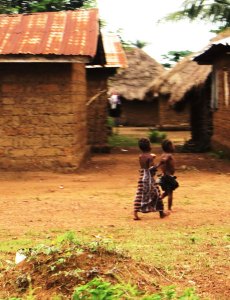
The journey began at 5:45 a.m. I walked to the bottom of Juba Hill in the dark to meet our driver for the day. Groggy, I had forgotten about AST, which meant he wouldn’t be there till around 6:30 a.m. I waited until the sun rose, and at long last, by 7 a.m., my coworkers and I were on the road. Tonkolili is a two-and-a-half-hour drive through fields, tropical jungle and about 15 small villages in between. I can only imagine how silly I looked to my Sierra Leonean colleagues, giddily snapping pictures of trees, water pumps, palm roofs and laundry, but they kindly indulged me. Many of the communities we passed, I noted, were sponsored by large international charities, like Free The Children or World Vision.
Our meeting in Tonkolili, predictably, started more than an hour late and ended more than two hours late, which meant we would be driving home in the dark. In Sierra Leone, night travel is dangerous in a proper vehicle, so it was unfortunate that we discovered around dinner time that our car’s lights, speedometer and rear-view mirror had fallen apart on the drive up. We drove slowly and kept our four-ways on, but still only narrowly dodged a head-on collision in the lane beside us. It was undoubtedly a deadly crash. A few kilometres later, we sped past a delivery truck whose underside was on fire. I protested on both occasions that we should stop and help, but was unanimously turned down by all of my co-workers: to pullover in the middle of nowhere at night with a white person was too dangerous, they told me.
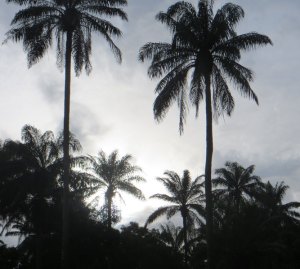
With every bump in the road, I could feel our tired car fall a little more apart. About five hours into the “two-hour drive,” and approaching midnight, the engine stopped completely. I waited by the side of the road while the driver put his bush mechanics skills to work.
I gazed up at the stars, and decided that I had never seen a more beautiful moonlit sky. I had no idea where we were, but everything still seemed… perfect. I absorbed that moment as completely as I could, taking note of the extraordinary places my life had taken me.
The radiator broke down two more times before we finally pulled into my driveway around 1:30 a.m. The car was smoking and hissing furiously, and I was six hours late, but like I said – crazy and hectic is all part of the routine. And thanks to AST, it didn’t matter that I was six hours late, Fat Boy and Kohla greeted me at the gates just the same.
Week Five: Breaking News
I still can’t decide whether I was in the right place at the wrong time, the wrong place at the right time, or some combination of both. As terrible as this week’s events were, I learned a lot from breaking this news story – the kind that called powerful people to account for their actions, adding to an archive of evidence highlighting the need for change in Sierra Leone.
On Monday, an unidentified police officer shot four unarmed civilians in central Freetown, critically injuring three and wounding another. It was right outside my office and I was the first (and only) journalist to cover it.
BLOOD ON THE STREETS OF FREETOWN
Bullets started flying around 2:30 p.m. One, two, three, four, I counted as people started to scream. By the time the second round of shots were fired, I had already grabbed my camera and notepad, and rushed to the window for a closer look.
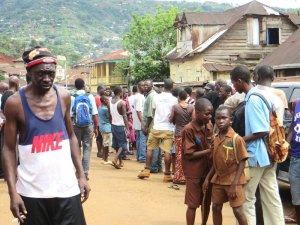
It was chaos outside. People ran in every direction, trying to get out of range. A man whose t-shirt was covered in blood stood up, met my eye, then ducked out of sight and was not seen again. Someone else was trying in vain to stop the bleeding from a friend’s neck. For the first time in my life, I had marshmallow knees.
My co-workers told me to stay inside and go back to my work, because “everything is fine.” But there were no police officers (none who weren’t shooting people) and no ambulances around – how could a roomful of journalists do nothing?
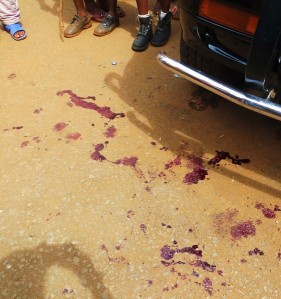
I asked this of my co-workers, who shook their heads, muttered something about police corruption and went back to their desks. I was frustrated and flabbergasted, and it was only upon reflection later that I would come to understand: a police officer shooting civilians is not new or unusual in Freetown, because it literally happens all the time. While I disagree that such an event does not merit coverage, it was my own privilege that blinded me to my their perspective.
I stepped into the shouting mob.
As a foreigner, a youth and a reporter, I was worried my presence would be poorly received. But as I fought my way through the crowd to get interviews, a handful of locals offered their assistance with translation and tracking down victims and witness. They wanted this story told, they said, no matter who reported it.

The officer had already fled the scene and the most egregiously-injured had been taken to the hospital in a cab. The street was stained with blood and chipped with bullet holes, and one of the shots had gone right through a store across the street.
“He [the police officer] was dressed in civilian clothing and carrying a gun,” said Edmond Williams, an eyewitness, in Krio. “He thought the youths were smoking marijuana.”
He pointed to the spot where the victims were shot.
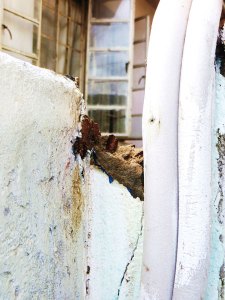
The officer went to arrest the three young men, Williams explained, but was reportedly refused entry into their home. He drew his weapon and called for back-up, while the men assured him they had stolen nothing would come peacefully. Three more Sierra Leone Police (SLP) officers appeared just in time to see their colleague open-fire on the crowd. All the officers ran before they could be identified.
All three of the youths in question were shot and 20-year-old Bailoh Johnson was clipped by a stray bullet fragment during the shooting.
“My right hand is heavy and I’m in a lot of pain,” said Johnson, clutching his bleeding arm. “I was scared to death. The police officers are crazy.” He was not involved in the altercation, he explained, but part of the crowd outside.
Though Johnson was not seriously injured, he was worried about the other victims, two of whom were in critical condition as of the time I published this post.
“I want him to lose his job and go to jail,” he said of the offending officer.
I was scared to death. The police officers are crazy… I want him to lose his job and go to jail.
A PATTERN OF POLICE CORRUPTION
Unfortunately, this was not an isolated incident. Police corruption and violence has been widespread across Sierra Leone for many years, and I can think of at least four officer shootings reported in the newspapers since I’ve been here.
“The government needs to stop the use of rapid firearms,” said 22-year-old Bakarr Bangura, who arrived on scene shortly after the incident. Standing near a trail of blood on the street, he said it feels as though somebody new is shot by an officer every week.
“It is their usual habit,” he said. “The government gave them the green card.”

Bangura is referring to President Ernest Bai Koroma’s purchase of nearly $5 million of firearms only a few months ago, using foreign aid money intended for Sierra Leone’s development. The weapons were bought for the SLP, which is said to be loyal to Koroma’s political party.
***
My coverage of the event included an on-camera interview and a print story. Clips from the interview made national news through the Sierra Leone Broadcasting Corporation, and my article was in Awoko newspaper the very next day.
Though reporting the story helped me feel as though I wasn’t a bystander, it took time to get over the shock of the shooting. I couldn’t believe that mere suspicion of light drug-use had somehow escalated to use of deadly force. It didn’t help that once in the hospital, one of the victims was abandoned by doctors because he didn’t have enough bribery cash to pay for their attention.
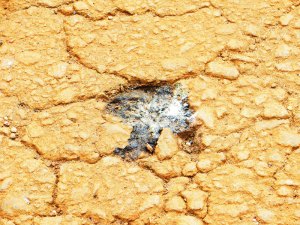
I was, and continue to be, inspired by the courage of those who were in the crowd during the shooting. In a country where people are persecuted for speaking out against police and government, they went on the record in the hopes that justice would be served. I admire their willingness to involve me, a foreigner, in a very sensitive local issue. It spoke volumes of their desire for a more democratic and transparent Sierra Leone – the mission at the core of my internship.
So whether I was in the right place or the wrong place, at the wrong time or right time, I took comfort in knowing my coverage had made a difference to this small group of people. Following my news report, the officer accused underwent a full investigation.
Week Six: “Democracy Begins with the Right to Speak”
“Democracy begins with the right to speak.” This is the motto of the Independent Radio Network (IRN), the publisher I work for in Freetown. After the commotion of last week, I thought it would be prudent to write about what I actually do on a day-to-day basis, when blood is not shed on the street outside my desk.
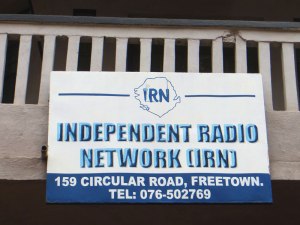
The network’s motto is simple, but packs a powerful punch in a country where voices are so systemically silenced. Sierra Leone’s past is marked by political violence, an overly centralized government and a 10-year civil war that has left entire generations traumatized, and many without any formal education, and suffering from permanent disability. Since then, Sierra Leoneans have struggled to participate effectively in civil and political decision-making. For years, corruption has left out the voices of marginalized groups, including women, children and the rural community.
DIVERSIFYING IRN’S COVERAGE
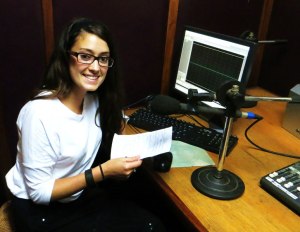
Part of my job is to find ways to include these voices in IRN’s radio programs. IRN is a network of 25 community stations across the country, that believe this inclusion is vital to Sierra Leone’s development. I listen to their broadcasts with an ear for content and technical quality, make recommendations to the national co-ordinator, and speak with producers from all provinces and departments to resolve any ethical or production challenges they face. This is an enjoyable task not only because the programs and people are engaging, but because it forces me to learn Krio whether I like it or not. Sometimes, I even get to guest host radio programs on Skyy Radio 106.6 FM, a neighbouring member station of IRN.
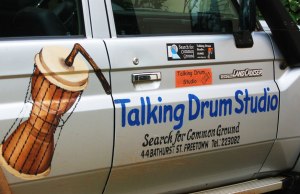
I also work for Search for Common Ground (SFCG), the NGO that brought me to Freetown and placed me at IRN. I blog for their website, write project reports, search for funders, and represent IRN at production meetings. SFCG is heavily involved with the November presidential election, so part of my work has been to create an evaluation form to help the elections observers monitor polling and voter registration.
Finally, I am leading a project to boost IRN’s online presence and audience interaction. At the moment, I am redesigning the network’s website, updating its content and serving as a temporary photographer. Those of you who know me may be shocked to hear I can be of any computer-related assistance at all – rest assured I am surprising myself too. In addition to putting the words and pictures together, I’ve put IRN on the social media map and now spend a great deal of time doing shameless self-promotion:
If you would like to learn more about the Independent Radio Network’s programs or activities, feel free to ‘like’ us on Facebook or follow us on Twitter!
Before I leave, I will train the staff to maintain these online tools and use them to augment public engagement with radio programming. Radio is the best way to reach people in a country where income, literacy rates and access to electricity are limited. As such, IRN’s programs cover a great deal more than the breaking news of the day: they cover current affairs, social issues and conflict resolution. Often, these themes are most effectively covered in dramatic skits or radio soap operas.
So far, my work has taken me all over Freetown and outside of it. My adventure at Mile 91 in Tonkolili is now weeks behind me, and I look forward to next weekend’s trip to Bo to talk about elections coverage with IRN’s member stations.

Not too long ago, I visited Sierra Leone’s House of Parliament to discuss a new radio program with the country’s deputy speaker. I suspect I am one of the last people who met him, as he unexpectedly passed away earlier this week. While I was there, I was fortunate to be granted a tour of the grounds, which included the Parliamentary Library, the Well of Parliament and the MP’s lounge. I was also permitted to sneak a photo, which is strictly against the rules.
AMPLIFYING WOMEN’S VOICES

This week, I went to a conference about women and governance in Sierra Leone, attended by journalists, activists, feminists, NGO leaders and educators from the Western Area Province. I have never met a more vibrant and spirited group of ladies, and felt right at home delving into issues of women’s education, health, representation and livelihood. They had a great deal to say about how Sierra Leone’s traditional social and cultural roles inhibit their participation in political and professional life.
Democracy begins with the right to speak. I looked around the room as the women discussed these issues in small groups. They can talk about them all they want, I thought, but that doesn’t mean anyone will hear them.
I asked my colleague Ezekiel later whether he felt his voice had ever been sidelined.
“I want to be a star,” he said eagerly, “a great stage actor.” His eyes lit up, but dimmed a moment later. He said in Sierra Leone, pursuing such a dream is not in the cards.
“The government doesn’t listen to what you want,” he explained. “There is no appreciation for talent here, they don’t care. Instead I have to go to school and be a doctor or a manager.”
TERRIFIC TWERKING

In other, more light-hearted news, that weekend, my neighbours challenged me to a dance-off. Well they didn’t actually, but as the girls started twirling and showing off, I allowed it to turn into one. When it was clear I was hopelessly outmatched in the twerking department, I struck up a meagre conversation. In broken Krio, I asked what they wanted to be when they grew up. It stunned them a little, and after a moment of deliberation, one of them said firmly, “a teacher.” The rest giggled and said they didn’t know. Their indecisiveness saddened me. At their age, I had already decided to be a singer, a police officer and an artist. Like the women at the meeting, these girls had the freedom to speak – what they lacked is the opportunity.
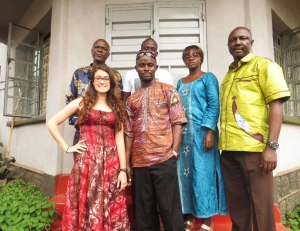
And what is freedom without opportunity? IRN believes the inclusion of all voices is an important stepping stone in bridging this gap, and works tirelessly on- and off-air to bring them to the political table. So though my days are not always exciting or fast-paced, there is no doubt in my mind that media development is a worthwhile pursuit in Sierra Leone. Everything my co-workers do at IRN brings us one step closer to a Salone (in Krio) where people can do more than just exist – they can pursue happiness in whatever way is fulfilling to them. Democracy may begin with the right to speak, but the right to speak begins with the opportunity to be heard.
Week Seven: Tourism in Sierra Leone
In the time I’ve spent here, I’ve tried my best not to look like a tourist. I certainly don’t live like one – like everyone else, I speak Krio, get lunch from Auntie Binta in the alley near my office, wear kitenge on Africana Fridays, and curse at the skies when the power cuts out. I fight my way into poda podas like the best of them and sing along to Sierra Leonean music. And then I see it: the cutest kids or the most creative hairdo; a colourful crab or an interesting tree. I fight the urge to whip out my camera, but at more than 200 photos a week, it’s clearly a losing battle.
TACUGAMA CHIMP SANCTUARY
As of the date of posting, there isn’t much of a tourism industry in Sierra Leone. That’s not for lack of things to do – there’s plenty to see if you know where to look. From the everyday rustics to the pounding nightlife, there are a thousand reasons to keep a camera with you. As of now, I’ve discovered 2,073 reasons.
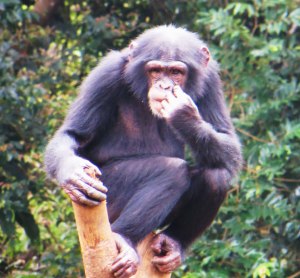
Last weekend, I visited one of the country’s most popular attractions – the Tacugama Chimpanzee Sanctuary. The reserve is about 40 minutes by road outside Freetown, in the depths of the lush green peninsula. For Le 40,000 (about CAD 10) you get a guided tour of the sanctuary, which is home to almost a hundred chimps. Human encroachment, habitat destruction and hunting for bush meat have made chimps an endangered species in Sierra Leone and it’s illegal to kill or keep one (the country’s elephants and lions were wiped out long ago). The animals in the reserve are all former house pets, kept in the cruelest of conditions until their rescue. Here at the reserve, they live in large forest enclosures and are slowly introduced to life in the wild. I recommend planning your visit around lunchtime, to catch them chowing down on fruit and bamboo sticks.
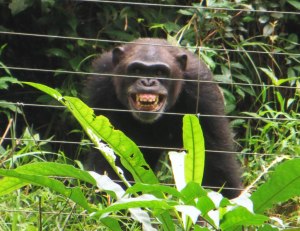
What extraordinary creatures: we had a unique interaction with each chimp, who responded to our presence in their own way. The guides (whose chimp sounds were so convincing we couldn’t tell the difference) taught us to recognize different calls and facial expressions, and it seemed as though the chimps were happy to see us – they jumped and made a scene (until the food arrived, of course). After practically inhaling their lunch, most rolled over, belly-up in a sort of monkey food-coma (something the chimps and I have in common).
TOKEH BEACH
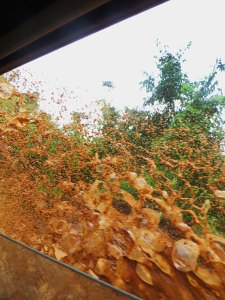
Sierra Leone is also world-renowned for its beaches. The best ones are outside Freetown and make Lumley Beach where I live look like a dirty bathtub. I took a Land Rover with some friends up to Tokeh, an incredible two-hour drive southwest through the jungle. The terrain was the roughest I’ve encountered so far, but well-worth the bruises in a landscape of creeping vines, howling monkeys, deadly cobras and the insects of the most horrifying nature. Rainy season is the most treacherous and most fun time of year for a bush drive in Sierra Leone.
Tokeh is home to a beautiful resort, white sands and some of Sierra Leone’s best known civil war ruins. It was too cold and rainy during my visit to take a swim, but I took a walk along the beach and explored the remains of what used to be a grand hotel complex of more than 500 rooms. It was destroyed by rebels during the civil war and is now overrun by mould, algae and coconut husks. As far as “ruins” go, Tokeh is pretty new in age – but it has no less of an impact on those who visit and are reminded of the deadly clash that took place there. It’s a beautiful place for a weekend get away, and I recommend staying at the Tokeh Beach Resort.
Above, the white sand at Tokeh Beach and one of several civil war ruins found along its shores.
THE COTTON TREE AND BIG MARKET
Freetown itself also has some great historical sites. Out near the Old Wharf facing the Atlantic Ocean lie the “Portuguese Stairs,” whose stones were set in 1818 and lead from the Government Wharf into the city. Many African slaves took their last steps on home soil here, as they were led down onto ships to be sent overseas. Decades later, when freed slaves returned home, they took the very same stairs up to town, earning the new name, “Freedom Steps.”
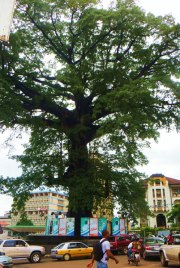 When the free men and women reached the top of the stairs, the first thing they saw was a massive tree at the centre of the village. Once upon a time, it provided shade over a thriving slave market, but today, still growing in the middle of Freetown, the Cotton Tree serves as a historical landmark and symbol of Sierra Leone’s colonial past. Be discreet with your photos of this landmark, or you’re likely to be chased away by an armed soldier or two.
When the free men and women reached the top of the stairs, the first thing they saw was a massive tree at the centre of the village. Once upon a time, it provided shade over a thriving slave market, but today, still growing in the middle of Freetown, the Cotton Tree serves as a historical landmark and symbol of Sierra Leone’s colonial past. Be discreet with your photos of this landmark, or you’re likely to be chased away by an armed soldier or two.
For the photo-crazed however, most of Freetown’s market merchants are slightly more forgiving. I made friends with a few of the shopkeepers in the Big Market on Wallace Johnson St., where beautiful handicrafts, kitenge fabrics and knick knacks stretch as far as the eye can see. I bought my Africana dress from Auntie Kadie (below), but had a hard time choosing between the thousands of rich, beautiful patterns. Keep your wits about you here – it’s easy to be dragged into lengthy negotiations by dozens of shopkeepers, stretching your visit from an hour to three or four. To the best of my recollection, I paid about Le 120,000 for my dress (CAD 30). The market is open every day but Sunday, from 7 a.m. to 7 p.m.
NIGHTLIFE AND THE NATIONAL MUSEUM
I tried to learn more about Sierra Leone’s history from the National Museum in Freetown, but every time I stop by, it’s closed. Outside the gates lies a sign that reads, “Papa Government – wi don work for nine months wi nor get we salary,” which essentially means the museum workers are on strike because they haven’t been paid in nearly a year. I hear the museum contains an impressive collection of ceremonial masks, costumes, instruments and weapons. Sadly, it was not re-opened by the time of my departure, but if you have better luck, entrance is free and you’ll be guided by well-trained staff through the exhibits. (I encourage you, however, to make a donation. Le 10,000 is appropriate).
Papa Government, wi don work for nine months wi nor get we salary.
Looking for something with hours that are a little more reliable? Try the bar, the only place in Freetown guaranteed never to strike. The club scene here is bumpin,’ with most parties starting at midnight and ending around 5 a.m. The best spots are on the coast in Aberdeen, not far from Lumley Beach. Aberdeen is home to some of the cheapest beach-side drinks in Freetown, and where a good chunk of the city’s expats live. A favourite haunt of mine is Atlantic, a club and restaurant near my house frequented by expats and locals alike, including night fighters – the local term for prostitutes. Atlantic opens right onto the beach, so if I get tired of mainstream 90s music (Shania Twain is a sensation in Sierra Leone), I hop off the patio and chase the sand crabs under the moonlight.
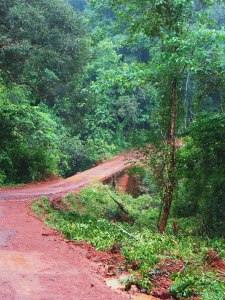
BUSH DRIVING
If you’ve got access to a vehicle (and you’re not too hungover), I highly recommend driving the Freetown Peninsula. A good three-hour ride boasts magnificent mountain views and trails that run deep into the rainforest, with perilous roads guaranteed to shake even the most dedicated thrill-seeker. If you’re not keen on shopping at Big Market, there are several small villages along the peninsula that sell fruit trees, wood carvings and other forest-based goodies. As with most villages, children will come running when they see a foreigner, so expect to be hailed with calls of “Aporto!” or “Pumui!” on the way. In these cases, a wink, smile and a high five go a long way (but bringing sweets with you go even further).
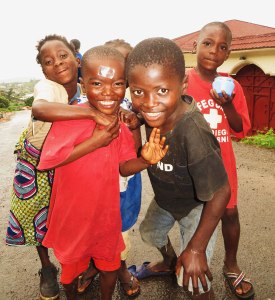
Last week, I took a hike up Leicester Peak only to be swarmed by the children around every corner. Seeing the camera dangling around my wrist, they cried: “Snap we! Snap we!” They were thrilled to see the photos afterward, and their parents got a good laugh out of it too. It was a very special moment indeed.
Sierra Leone offers a wealth of unique experiences if you’re willing to go a bit off the beaten track; there are four provinces and 12 districts full of culture and no two tribes are the same. When I met the Paramount Chief of Tonkolili I wasn’t allowed to take a photo – every place you visit has its own laws and customs. But learning them is the most exciting part, even if it means I have to curb my camera enthusiasm.
Week eight and nine: No offence, Dorothy
In The Wizard of Oz, country girl Dorothy wakes up in a magical world of flying monkeys, Munchkins and tin men. No longer in Kansas, I guess you could say she experienced “culture shock.” From the fighting apple trees to the poisonous poppy fields, around every corner in that mysterious land, a new surprise awaited her.
In the latter half of my stay here, I feel a bit like Dorothy, wandering around my very own West African Oz. You’d be hard-pressed to find a yellow brick road in this country, but everywhere I turn I find adventure, challenge and excitement.
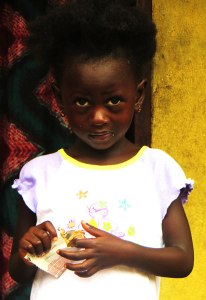
Dorothy’s first surprise was being greeted by Munchkins as “the young lady who fell from the sky.” I travelled by road in a jeep, but was also greeted in a new land by strange name – ‘Aporto.’ I took a four-day trip to Njala, Taiama and Bo this weekend, further outside of Freetown than I’ve ever been. And just as the Munchkins had never seen a witch like Dorothy, many of these children had never seen a white person.
Unlike Dorothy however, I haven’t spent in Sierra Leone here wishing to be somewhere else.
At the end of the movie, Dorothy clicks her ruby heels together and utters, “There’s no place like home.” The old adage is certainly true, but having immersed myself in an entirely new culture, I believe our concept of ‘home’ is constantly changing. There’s a difference between visiting and living somewhere; a difference between travelling and moving in. Sierra Leone doesn’t feel like somewhere I’m visiting, it feels like my new home.
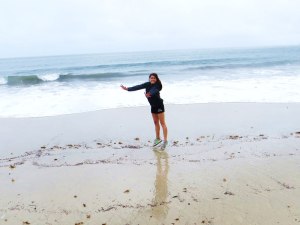
At times, it’s been intimidating. It took me seven weeks, a hundred flubbed attempts and a couple of really embarrassing moments to master this country’s handshake – a revolving combination of props, the electric finger-slide and a 15 minutes of hand-holding afterward. I still haven’t gotten over the frustrations of living in AST and for the last nine weeks, my tongue has known only one sensation: spice-induced burning.
When I first landed in Salone – fresh off the boat – I felt like Dorothy, “the small and meek.” I was timid around new food and new people, and focussed on getting by rather than experiencing and embracing life in my new country. In my last few weeks here, I’ve officially become Magenda, the Big and Strong.
I know my Oz is not as romantic as the fairytale, but what Sierra Leone lacks in romance, it makes up for in optimism and resilience.
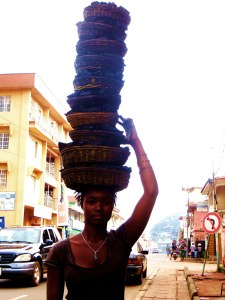
Every day, women and children carry the weight of the world in baskets, while 22 people pack themselves in a single vehicle to get to a job where they earn CAD 3 a day. There is passion and conviction here like I have never seen, from people who let faith guide them rather than the contents of their wallets (to be clear, corrupt politicians are an exception).
I really do feel at peace here.
That’s not to say life has been peachy – piles of things have gone wrong in the last two months, from malaria to car accidents and mysterious insect bites. Yesterday, I fell into a shit-filled sewer, came out with a gaping leg wound and watched my shoe float away. All of my things smell like damp cheese on account of the rainy season, and my half of my belongings are covered in mould.
I’ve had cross-cultural misunderstandings that resulted in hurt feelings. I’ve had travel plans ruined and I’ve sat in front of a computer screen in tears with an Internet and phone connection too weak to call home. But Sierra Leone wouldn’t feel like home if I never had to earn my stripes. Dorothy may have defeated the Wicked Witch, but I covered a police shooting on national television.

“If I ever go looking for my heart’s desire again, I won’t look any further than my own backyard,” says Dorothy, safe at home, having learned her lesson. But if I’ve learned anything at all from my experience here, it’s that only through leaving our backyards do we come to truly understand what our hearts desire at all.
Dorothy went back to Kansas in a hot air balloon. I’m going back to Ottawa on Air France. And while there certainly is no place like home, Sierra Leone will more than do for now. No offense, Dorothy.
In Week 10, I crossed by road from Freetown to Conakry, Guinea. Click here to follow my adventure, and read more about things to see and do in Conakry.
Week 11: The Rodgers and Hammerstein Moments
Seven days, a box of cookies and a 16-hour bus ride later, I flopped back onto my sunken-in bed at Juba Hill. I never thought I’d be so utterly relieved to come back to a powerless, waterless, critter-infested bedroom, but after a week in Guinea by myself, I couldn’t have been more excited to be back in Sierra Leone. I had only two days left to bask in the ambiance of my summer home and was determined not to miss a thing.
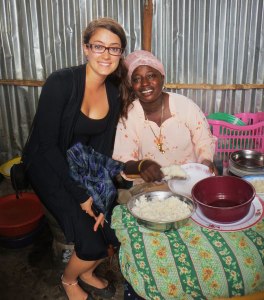
I woke up the next morning to a beautiful, sunny day; a rare treat at the peak of the rainy season. I packed and wrote thank you letters to those who had touched me most, then walked to the market alone, soaking in every sight, smell and touch. I took my last okada ride and gave away much of my clothing and shoes. The remainder of my precious Kraft Dinner stash went to Aminata, of course, who had become extremely fond of my comfort food over the summer.
My goodbye party was bittersweet. My co-workers and I went out for dinner, where I was showered with thanks and gifts. Millicent, Ezekiel and I finally had the dance competition we had talked about for months, as I was desperate to disprove their “white people can’t dance” theory. I like to think I succeeded, or at least, performed admirably.

My transit back to Canada was as smooth as they come. Aminata sung for me on the way to the ferry, my flights were on time and my luggage made it back in one piece. My parents were waiting at the terminal with a video camera and a sign that read, “Ms. Pumui Magenda.” There were no tears, but my hampering mother jumped up and down, and nearly crushed me in a bear hug.
For the last two months, I’ve been reuniting with friends and family in Canada. But now that the dust has settled and the food euphoria has passed, I’m constantly thinking about the world I left behind: a world of children chasing chickens, hissing okadas, the smell cooking cassava and bites from fire ants; a world where I could watch fishermen haul in their nets and breath in salty ocean air, imaging how far across the water Canada is. Despite all my adventures, I decided that these still, quiet moments were the highlight of my trip – the ones that make you pause, and internalize the complex beauty of the world so profoundly, you achieve something approaching serenity.
I was sitting in a crowded poda poda one day, not too long ago, with an American intern who had just arrived in Freetown from Washington, D.C. I was showing him around the city and we were on our way to the beach. Too tall for the packed bus, he was crouching uncomfortably, squashed in between a full row of passengers, while my own head bumped the metal rails of the door handle. Yet crammed and sweating, there we were, chatting away about our favourite Rodgers and Hammerstein musicals. At that moment, I was hit with a taste of that serenity – complete appreciation for the whacky and incredible life that had me on a broken van in the middle of West Africa, talking about musicals.
 From that point onward, I called them the ‘Rodgers and Hammerstein’ moments. Now in Canada, I reflect on them often. When I left Sierra Leone, my co-workers gave me a job: “Tell them,” they said. “Tell them about us.” I promised I would. Mr. Sesay in particular asked me to talk about the REAL Sierra Leone – not the Heart of Darkness version, not the Blood Diamond version, not the commercials plastered over the airwaves by child sponsorship programs. Challenging these stereotypes is part of the reason I became a journalist, and remain a journalist today.
From that point onward, I called them the ‘Rodgers and Hammerstein’ moments. Now in Canada, I reflect on them often. When I left Sierra Leone, my co-workers gave me a job: “Tell them,” they said. “Tell them about us.” I promised I would. Mr. Sesay in particular asked me to talk about the REAL Sierra Leone – not the Heart of Darkness version, not the Blood Diamond version, not the commercials plastered over the airwaves by child sponsorship programs. Challenging these stereotypes is part of the reason I became a journalist, and remain a journalist today.
Next time I see a Rodgers and Hammerstein musical, perhaps Oklahoma! or The Sound of Music, my mind will be far away in sweet Salone, the Land of Big Smiles.
Know Before You Go
Travel Tips
- Bring enough cash with you to get through your entire trip. As of 2012, there were no real ATMs to be found in Sierra Leone, and the only option for obtaining more cash was through MoneyGram or Western Union.
- Exchanging U.S. cash for Leones is easy on the streets, and you won’t have to walk to find a dealer with wads of bills in hand. Look up the going rate online, and stick to it, or you’re likely to be ripped off.
- Don’t take photos of government builders, or in visual range of any soldier.
- Be extremely careful with food and water hygiene in Sierra Leone, where cholera and other waterborne diseases are common. Check the authenticity of your water bottles, peel your fruit, and if you eat at a local restaurant, buy something cooked.
- It was election time in Sierra Leone when I visited, and I was cautious about wearing any colours belonging to a specific political party. This may not apply to you during your trip, but it’s something to think about.
- Don’t skip a single day of your malaria meds. If anything happens to them, more can be purchased from a pharmacy in Freetown.
- Don’t be offended if someone hisses at you – that’s just how people get your attention.
- Rabies was not a required vaccination in 2012, and I didn’t get a rabies shot. That said, I didn’t do too much bushwhacking through the forest near monkeys and bats. If this is part of your plan, you may wish to get one.
- If this is your first visit to Sierra Leone, I don’t recommend interprovincial travel by bus. Too much can go wrong. It’s worth the cash to hire a driver for the day, who can take you to the sites around the Freetown Peninsula or the beaches. Among the reputable car hire companies in Sierra Leone:
- It may seem obvious, but bring a sturdy umbrella and a good flashlight. The power cuts out often, and the umbrellas sold on the street will break in the most tempered rainstorm.
- Do as much map printing, jotting down phone numbers, and planning in advance as you can. Internet access in Sierra Leone was extremely poor as of 2012.
- Buy a local SIM card for your phone, since you likely won’t be emailing any tourism companies, hotels or car dealers, many of which don’t have websites. Texting and calling will be much more effective.
- If someone asks you to ‘flash them,’ it means call them and hang up, so they can store you number in their phone and no one has to pay. If you keep getting phone calls, and people hang up, it means they want you to call them back, so that your phone will be charged for the conversation.
- Phones in Sierra Leone, like many African countries, use a ‘credit’ or ‘top up’ system. Once you buy the SIM card, buy credit from a local vendor. As you text and call, your credit will run out, and it’s time for another top up. Calls and texts sent to phones that use the same service provider are cheaper.
- In retrospect, I wish I had visited Banana Island, a beautiful beach and resort for sport fishing, scuba diving, scenic boat trips, and historical ruins. Don’t skip it, like I did!
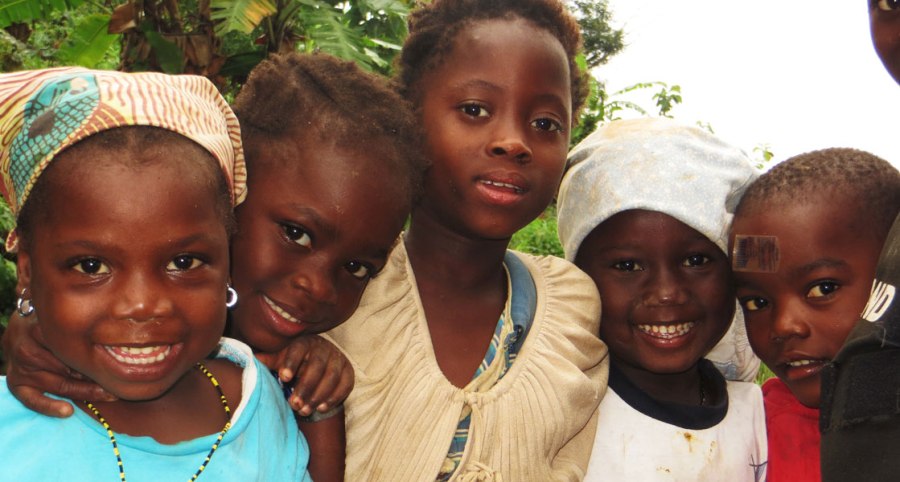
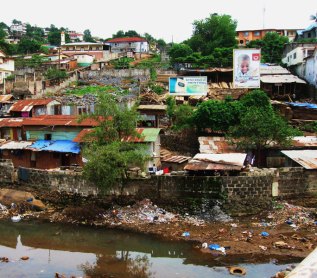
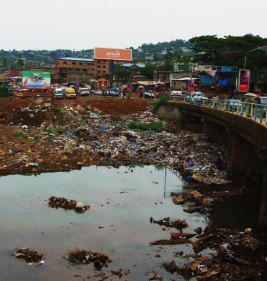
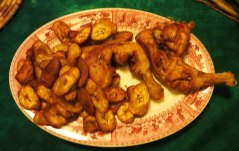
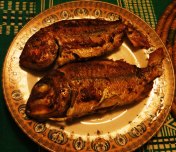
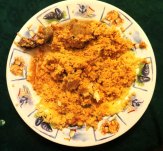

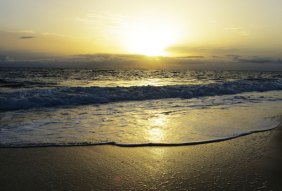
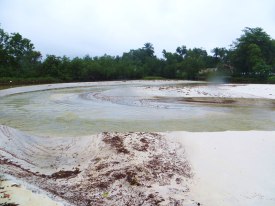

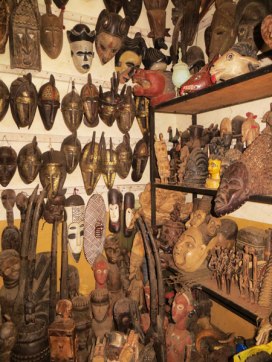
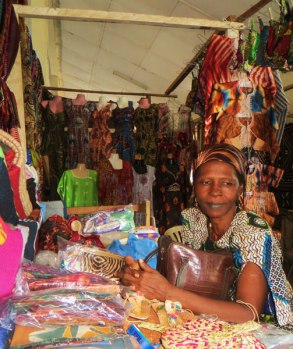

Wow, sounds like you are learning a lot about diversity. I’ll bet you will have a whole new appreciation for western lifestyle when you rupturing home! Sounds like you are having fun, and when you do return, I want to see you skin a fish with my own eyes 🙂 stay safe!!!!
Wow is all I can say! Where have the years gone??? I feel like so much time has been lost since I last saw you…what an experience… Be safe and have fun….this is no doubt a life altering journey….
Love the beach shot Eilzabeth. Looking foward to your next entry
Great article Elizabeth. I loved the way you threaded the theme through your writing. Have you ever thought of journalism as a career?
Felt like I was reading the travel section of the Ottawa Citizen on a Saturday afternoon. Impressive blog! Love the pictures. You look “at home.” So glad to hear from you.
Wonderful depiction of life in Sierra Leone. Looking forward to all of your future bloggings. Sounds like you are adjusting well to your new surroundings.
I really enjoyed reading your entries – makes me want to get back on the road again! Great writing style! More pictures would be nice especially of the locals if they will let you take them. I would like to show my daughters what life is like and the best way for them to understand it would be to see kids their own age – sans Hollister, Abercrombie etc!!!!
Enjoy and don’t eat any pig!!!
Elizabeth I really enjoyed reading week 6. It was very engaging and I find your writing style has a delightful balance between being insightful and entertaining. Keep up the good work!